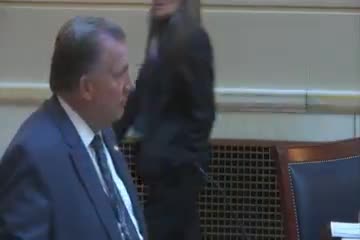Utah Senate rejects measure giving limited prescribing authority to psychologists amid heated debate
Get AI-powered insights, summaries, and transcripts
Subscribe
Summary
SALT LAKE CITY — The Utah Senate on Feb. 21 rejected Second Substitute Senate Bill 26, a sweeping behavioral health measure that included provisions to allow certified prescribing psychologists to prescribe certain psychotropic medications under defined educational and supervision requirements.
SALT LAKE CITY — The Utah Senate on Feb. 21 rejected Second Substitute Senate Bill 26, a sweeping behavioral health measure that included provisions to allow certified prescribing psychologists to prescribe certain psychotropic medications under defined educational and supervision requirements.
Senator Bramble, the bill sponsor, told colleagues the measure was intended to expand access to mental health care and included multiple guardrails: certified prescribing psychologists would be required to complete didactic training (described in an amendment as 30 didactic hours), meet clinical-practice thresholds (the amendment set that at 4,000 hours or two years, whichever is greater), and establish a collaborative relationship with a health-care practitioner overseeing the patient’s general medical care. ‘‘A certified prescribing psychologist may only prescribe psychotropic medication for a patient if the certified prescribing psychologist identifies a health care practitioner currently overseeing the patient’s general medical care, establishes, and maintains a collaborative relationship with the health care practitioner,’’ Bramble said during floor remarks.
Senator Vickers explained Amendment 4, which sponsors said clarified didactic and clinical requirements after negotiations with medical groups. He emphasized the bill expressly forbids certified prescribing psychologists and provisional prescribing psychologists from prescribing or administering narcotics or controlled substances.
Opponents raised procedural and safety concerns. Senator Kennedy, a physician, described the prescribing provision as a ‘‘major policy shift’’ buried inside a larger bill and said he had not seen adequate documentation about which drugs would be allowed. ‘‘If you wanna prescribe medicines, at least go to PA school,’’ Kennedy said, challenging the depth of training the bill would require and warning of dangerous outcomes if the wrong medications were used. Kennedy and several colleagues urged separating the prescribing component from the broader behavioral health package for a standalone, public debate.
Other senators voiced mixed responses: Senator Plumb said he had ‘‘enlightening conversations’’ with sponsors but remained uncomfortable with the prescribing piece and urged caution; Senator Thatcher and other supporters framed the bill as an urgent step to expand access to care given provider shortages and crisis response needs.
The measure advanced through an amendment process and a series of floor votes on the amendment and the bill itself. After extended debate, the Senate took the final roll call on the second substitute. Second Substitute Senate Bill 26 failed, having received 10 yes votes and 16 no votes (3 absent), and will be returned to staff for filing.
Why it mattered: Sponsors said the bill would create a tightly limited pathway to expand access to psychotropic medications in a state that faces behavioral health workforce shortages. Opponents said the prescribing authority represents a fundamental expansion of scope of practice that merits its own standalone consideration, clearer definitions of allowable medications and tighter statutory language.
What’s next: Because the bill failed in the Senate, the prescribing provisions will not move forward as written. Sponsors and interested parties may revise the language and seek future introduction or separate measures addressing prescribing authority, training standards and the physician collaborative framework.
Provenance: Discussion and votes on Second Substitute Senate Bill 26 appear in the Senate transcript from SEG 1990 (floor amendment and discussion began) through SEG 2564 (final vote and disposition).
